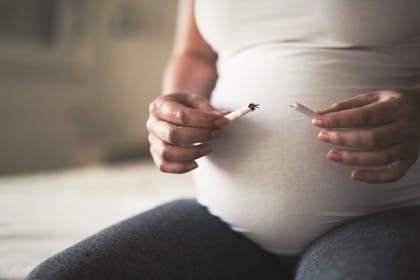Smoking during pregnancy: the risks, the effects and how to stop

This page contains affiliate links, which means we may earn a small amount of money if a reader clicks through and makes a purchase. All our articles and reviews are written independently by the Netmums editorial team.
Smoking during pregnancy increases your risk of miscarriage, early labour, stillbirth and SIDS, which makes it important to quit as soon as you can. We look at the effect it has on your pregnancy, the risks to your baby's health, growth and development – and how to stop. Plus, why it's never too late to kick the habit.
What smoking does to your unborn baby
When you're pregnant, everything from the food you eat and the air you breathe affects your baby.
This means that when you smoke a cigarette, you're breathing in thousands of harmful chemicals, including tar and carbon monoxide – and so is your baby.
This robs your baby of everything it needs to develop, thrive – and even survive, as the Royal College of Obstetricians and Gynaecologists (RCOG) explains:
FREE NEWBORN NAPPIES
'Just as smoking is bad for you, babies in the womb can be harmed by tobacco smoke because it reduces the amount of oxygen and nutrients that pass through the placenta from you to your baby.'
What are the health risks of smoking during pregnancy?
Smoking can cause serious health problems for your pregnancy. It increases your risk of:
- miscarriage
- stillbirth (one-third of all deaths in the womb or shortly after birth are thought to be caused by smoking, says RCOG)
- ectopic pregnancy
- complications during labour
- premature birth
- placental abruption (when the placenta separates from the uterus too early on)
- low birth weight
- birth defects (cleft lip or palate).
What are the risks of passive smoking during pregnancy?
If your partner or another family member smokes, this is just as dangerous for your baby.
Public Health England advice states that 'a smoke-free home is essential during and after pregnancy'. Here are some facts worth knowing about the dangers of secondhand or passive smoke:

- There is no safe level of secondhand smoke.
- Secondhand smoke harms a developing foetus with the increased risk of miscarriage, stillbirth, placental abruption, birth defects etc.
- Opening windows doesn’t protect a mother or baby from secondhand smoke.
- Tobacco smoke lingers for a long time and many of its constituent particles are invisible to the naked eye.
What's more, each year, children exposed to secondhand smoke results in:
- 22,000 cases of asthma
- 200 cases of bacterial meningitis
- 9,500 hospital admissions
- 40 sudden unexpected deaths in infancy (cases of SIDS).
Source: PHE / Smokefreeaction.org.uk
How smoking affects your newborn baby
Your baby will have developed a taste for nicotine, even before being born. This can make him irritable and stressed as he struggles to cope without it.
Smoking in pregnancy can also trigger a number of childhood illnesses and conditions, once your child is born. These include:
- bronchitis
- pneumonia
- asthma
- glue ear
- ear, nose and throat problems
- hyperactivity or ADHD (attention deficit hyperactivity disorder).
It also increases your child's risk of sudden infant death syndrome (SIDS) by at least 25%.
What are the benefits of stopping smoking before or during pregnancy?
As well as improving your own long-term health and helping you get pregnant faster – 'stopping smoking reduces all the risks described above,' explains RCOG.
This refers to everything from miscarriage and stillbirth down to ADHD.
Have I left it too late to stop smoking?
It's never too late to stop smoking during pregnancy, according to the NHS' Smokefree campaign, which says:
'No matter what stage you're at in your pregnancy, it's never too late to stop smoking. It can be difficult, but smoking is much more harmful to your baby than any stress quitting may bring.'
Is NRT safe to use during pregnancy?
NRT (nicotine replacement therapy) is a popular and effective way to stop smoking. It works by weaning you off the nicotine with low doses of it in different forms. These might include:
- gum
- patches
- lozenges
- sprays
- strips
- inhalator
It's considered safe to use during pregnancy because it doesn’t contain poisons such as tar or carbon monoxide, which are harmful.
Whether you quit smoking via your GP or the NHS stop smoking service, Smokefree, you'll be able to get NRT products on prescription as soon as you have your Maternity Exemption Certificate.
During your pregnancy (and for up to a year after giving birth) prescriptions are free, so quitting won't even cost you a penny.
Can I use e-cigarettes during pregnancy?
Although e-cigarettes are a safer option than smoking real cigarettes, they're not recommended for pregnant women.
RCOG explains:
'As the long-term risks for your baby from using them are not known, they are not recommended in pregnancy,'
The second best thing after stopping smoking completely would be to use NRT (see above) to cut down and eventually stop.
Smoking cessation in pregnancy: how to quit
Quitting smoking can be a daunting prospect. After all it takes a lot more to quit than just stubbing out a cigarette.
Luckily help is at hand and it's closer and more effective than you may think ...
When you see your GP or midwife to confirm your pregnancy, you'll be referred to a specialist midwife or stop smoking adviser for support.
You'll most likely be linked up to the NHS stop smoking service, Smokefree, which has specialist advisors ready to help via one-to-one or group sessions. There are meetings across the UK and statistics show you're four times more likely to quit with NHS support.
Find your nearest NHS Stop Smoking Service here.
You're also twice as likely to succeed with some kind of support along the way and you'll always find fellow mums who are kicking the habit or who've kicked the habit in our Coffeehouse forum.
Another way to make quitting easier is to make sure your partner quits, too.
Research shows that you'll find it harder to quit and are more likely to relapse and start smoking again even if you do manage it.
Other organisations to help you quit smoking include:
QUIT – the UK charity that helps smokers to stop and young people to never start.
Ash – action on smoking and health, a public health charity that works to eliminate the harm caused by tobacco.
NCSCT – the national centre for smoking cessation and training.
Boots Smoking Control Services – from referring you to the NHS Smokefree service to recommending products, talk to your in-store pharmacist for help and support.
Related stories
Is it safe to fly in pregnancy?




